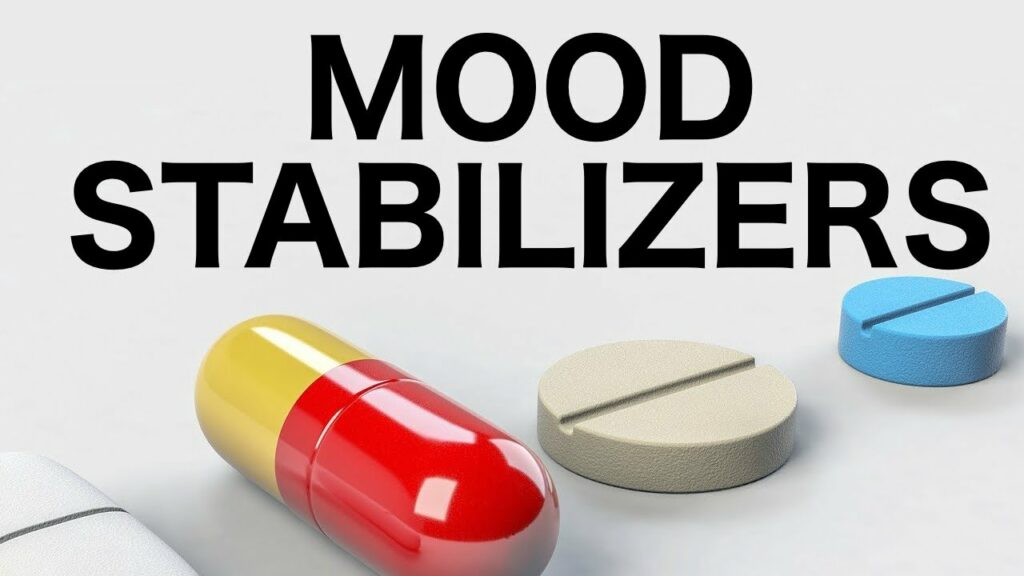Mood stabilizers are medications prescribed to people who experience symptoms of bipolar disorder, a serious mental illness. They can help to control the mood swings that are a hallmark of the condition, and they can also help reduce the risk of suicide. This comprehensive guide will teach you everything you need to know about mood stabilizers, from the basics of how they work to the best brands and options available.
Contents
What Are Mood Stabilizers?

Mood stabilizers are medications that are used to treat mood disorders, including major depressive disorder (MDD), bipolar disorder, and seasonal affective disorder (SAD). They work by helping to control the symptoms of your mood disorder.
There are a variety of mood stabilizers available, each with different benefits and side effects. We’ve detailed the most popular types of mood stabilizers below.
Mood stabilizers work by controlling the symptoms of your mood disorder. They help relieve feelings of sadness, anxiety, stress, and anger, and can help you feel more stable and confident. Some mood stabilizers also have antidepressant effects.
Types of Mood Stabilizers
There are several different types of mood stabilizers, each with its benefits and side effects. Here are the four main types of mood stabilizers: antipsychotics, antidepressants, benzodiazepines, and lithium.
Antipsychotics
Antipsychotics are drugs used to treat schizophrenia and other psychiatric disorders. They work by altering the way the brain processes information. Some antipsychotics are also used to treat anxiety and depression. They have serious side effects, including weight gain, diabetes, and death, so it is important to weigh the risks and benefits before taking them.
Antidepressants
Antidepressants are medications used to treat major depression in adults. They work by altering the way the brain processes messages from your brain cells. Antidepressants also have side effects, including weight gain and sexual problems. It is important to weigh the risks and benefits before taking them.
Benzodiazepines
Benzodiazepines are drugs used to treat anxiety and insomnia. They work by calming the brain and relieving anxiety and sleep problems. Benzodiazepines have a few side effects, including drowsiness, memory problems, and nausea. It is important to weigh the risks and benefits before taking them.
Lithium
Lithium is the most commonly used mood stabilizer. It works by controlling the levels of chemicals in your brain that can cause mood swings. Lithium is a prescription medication, and it may be prescribed for long-term use to help control the symptoms of MDD or bipolar disorder. Side effects of lithium include weight gain, diarrhea, and changes in blood pressure, heart rate, and electrolytes. It’s important to note that lithium can also cause serious side effects if it’s not properly taken, such as a risk of developing kidney stones.
Valproate
Valproate is another commonly used mood stabilizer. It works by affecting the way your brain cells communicate with each other. This can help control the symptoms of MDD and bipolar disorder. Side effects of valproate include weight gain, changes in appetite, sedation, and liver problems. It’s important to note that valproate can also cause birth defects if it’s taken during pregnancy.
Carbamazepine
Carbamazepine is a mood stabilizer that works by affecting the way your brain cells communicate with each other. This can help control the symptoms of MDD and bipolar disorder. Side effects of carbamazepine include changes in mood, dizziness, drowsiness, and problems with vision and hearing. Carbamazepine is also known to cause skin reactions, including rash and blisters. It’s important to be aware that carbamazepine can cause long-term side effects, such as an increased risk of developing Alzheimer’s disease.
Gabapentin
Gabapentin is a mood stabilizer that works by affecting the way your brain cells communicate with each other. This can help control the symptoms of major depressive disorder (MDD), bipolar disorder, and SAD. Gabapentin is also known to cause drowsiness, weight gain, and changes in appetite. Side effects of gabapentin include dizziness, blurred vision, and problems with coordination. Gabapentin should not be used by pregnant women or individuals who are pregnant because it can cause birth defects.
How Do Mood Stabilizers Work?

The mechanism of action of mood stabilizers is not fully understood. It is thought that they work by modulating neurotransmitter systems in the brain, specifically those involving serotonin and dopamine. Mood stabilizers are believed to help stabilize mood swings by restoring the balance of these neurotransmitters.
These medications work by blocking the reuptake of serotonin and/or dopamine. This action increases the levels of these neurotransmitters in the brain, which helps to stabilize mood. Mood stabilizers are thought to help correct abnormal functioning in the brain that may be responsible for mood swings.
Also, some mood stabilizers act on other neurotransmitter systems, such as the gamma-aminobutyric acid (GABA) system. GABA is a neurotransmitter that has a calming effect on the brain. Mood stabilizers that act on this system can help to reduce anxiety and improve mood.
Side Effects of Mood Stabilizers
Side effects of mood stabilizing medications can be serious and may include: decreased appetite, weight loss, dizziness, drowsiness, fatigue, confusion, and even seizures. Before starting any new medication, be sure to discuss any potential side effects with your doctor.
Mood stabilizers may also increase the risk of suicide. If you are considering suicide, talk to your doctor or mental health professional.
Mood stabilizers should not be taken if you are pregnant or breastfeeding. If you are pregnant, discuss the risks and benefits of taking a mood stabilizer with your doctor. If you are breastfeeding, be sure to talk to your doctor about any medications you are taking.
Certain mood stabilizers may also increase the risk of birth defects. Be sure to discuss any potential risks with your doctor.
How To Take a Mood Stabilizer?

mood stabilizers are medications that help to improve moods and reduce anxiety and depression. Mood stabilizers can be prescribed by a doctor, but there are also many over-the-counter (OTC) options. Keep in mind that not all mood stabilizers are the same; some may be better for specific types of mood problems.
Here’s a guide to taking a mood stabilizer:
Step 1: Read the medication’s label carefully. Each drug has different instructions for how to take it and for when it is most effective.
Step 2: Follow the instructions on the label. Most drugs should be taken orally, but there are some exceptions, such as lithium carbonate, which can also be taken by injection. The time it takes for a drug to work can vary, so it is important to take the medication at the same time every day. If you have trouble swallowing pills, talk to your doctor about other ways to take the medication.
Step 3: Be patient. It can take up to four weeks for a mood stabilizer to start working, so please don’t give up if your first attempt doesn’t work right away. Keep trying different doses until you find one that works for you.
Step 4: Let your doctor know if the medication isn’t working or if you have any side effects. He or she can help you to decide if a different drug is necessary.
Remember, it is always important to talk to your doctor about any mental health problems you are experiencing. He or she can help you find the right medication and give you advice on how to best take it.
Conclusion
If you’re looking for a way to improve your mood and reduce the risk of mood swings, then you should consider taking a look at mood stabilizers. This type of medication can be very effective in helping to stabilize your emotions and restore your balance. If you are considering using a mood stabilizer, it’s important that you understand the different types available and which might be best suited for your specific condition. In this guide, we have discussed the different types of mood stabilizers available as well as provided tips on how to find the right one for you.
Hope this article was of help to you! If you are suffering from mental health disorders, you may seek help from Therapy Mantra. We have a team of highly trained and experienced therapists who can provide you with the tools and skills necessary for overcoming mental health disorders. Contact us today to schedule an online therapy or download our free Android or iOS app for more information.


